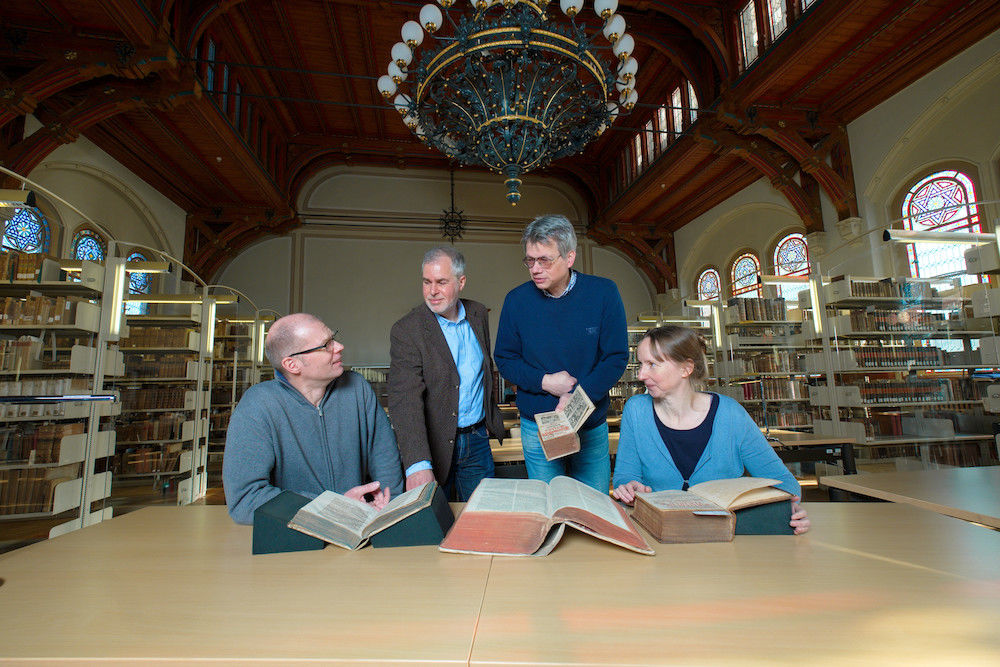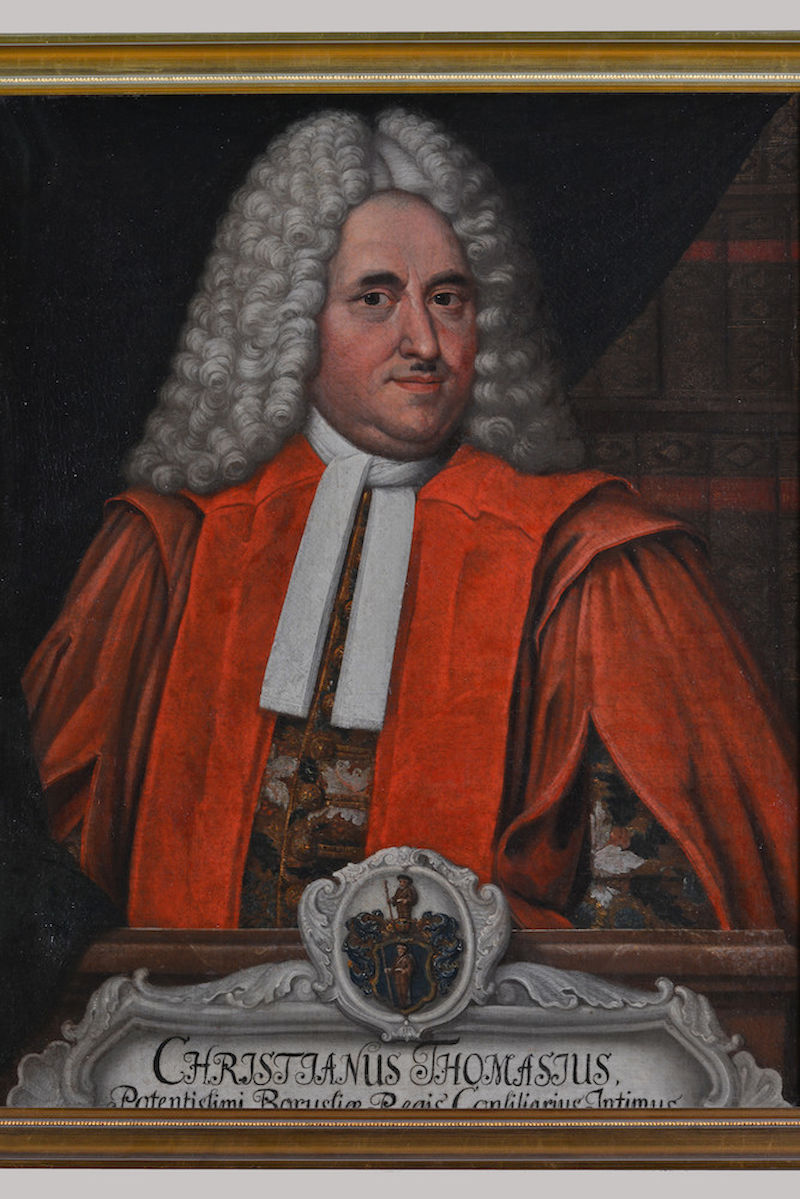Letters from the belligerent spirit

If one were to judge Christian Thomasius on the quality of his correspondence, one would most probably use less than complimentary terms to describe him. In stark contrast to his contemporary Gottfried Wilhelm Leibniz, who considered crafting letters to be a significant, constituent part of his work, the influential intellectual Thomasius often considered this task rather onerous. When it came to replying to, or archiving correspondence therefore, Thomasius was negligent. Unsurprisingly, those with whom he exchanged letters would at times complain about Thomasius’ late replies, or indeed, about responses which never came.
With this in mind, it seems rather surprising that the first of four volumes containing the professor’s letters is now available at Martin Luther University Halle-Wittenberg (MLU). The volume contains all correspondence written or received by Thomasius between 1679 and 1692. To be more precise, the volume contains 268 letters, which, despite the tardiness described above, have remained intact for posterity.
In total, there are 1200 examples of correspondence, which the project leader Dr Frank Grunert and his colleagues, the historian Dr Matthias Hambrock and the political scientist Dr Martin Kühnel from the Interdisciplinary Centre for European Enlightenment Studies (Interdisziplinäres Zentrum für die Erforschung der Europäischen Aufklärung, IZEA), have been collating and reconstructing since 2010. The majority of letters originate from different archives and libraries in locations including Copenhagen, Hamburg, Berlin and, of course, the City of Halle. The letters have been divided into four volumes, which will be rounded off with a biographical dictionary.
“The letters reveal an exciting picture of the everyday life of an academic. And they show which topics really concerned Thomasius,” explains co-editor Frank Grunert. The group have been able to access parts of Thomasius’ correspondence with academic colleagues, as well as institutions. This includes a letter that Thomasius received from the council of the City of Halle in August 1690. In the letter, the city elders try to explain to the professor, who was living in the City of Halle, and who had already fallen into disfavour at the University of Leipzig, why he could not hold his lectures in the local “Ratswaage”. This building was used for both weddings and local meetings, as well as theatre performances. And although the German in which the letter was first formulated sounds somewhat strange to today’s reader, the degree of reservation and unwilling with which the message is expressed is still obvious 300 years later.
On multiple occasions throughout the volume it becomes clear that Thomasius was an argumentative individual, who made no effort to avoid confrontation. What’s particularly clear is that more often than not, his letters concern arguments or disputes. These arguments are voiced with a clarity and directness, which would be quite shocking for us today. A typical example of this is the letter which Thomasius addressed to the clergy of Leipzig, the so-called “Geistliche Ministerium”, on 3 July 1689. In this letter, he classifies the members of the clergy according to their propensity to engage in disputes or conflicts. Thomasius hereby places the theologian August Pfeiffer in the worst category. Writing in archaic German, Thomasius explains that Pfeiffer has vilified him, spending almost an hour deriding him, describing him as a villain and rogue to his listeners, “bey nahe eine gantze Stunde auff mich nahmentlich gelästert, und mich als den ärgsten Schurcken ausgemachet”. As such, Thomasius considers it quite impossible that he would ever come to any kind of agreement with Pfeiffer.
Some of the letters, however, prove that Thomasius has a softer side. This becomes quite clear, for example, when it comes to Thomasius’ own professional situation. One sees just how uncertain Thomasius could be. This becomes acutely clear in the letter Thomasius wrote on 15 March 1690 to his former teacher Johann Christoph Becmann in Frankfurt. Thomasius outlines his concern that he would be banned from publishing or teaching in Leipzig. It is quite clear that Thomasius did not have a “plan B” when it came to his existential problems.
By bringing together these complex and multidimensional texts, the team at IZEA have achieved what the historian Matthias Hambrock has referred to as, “painstaking detective work”. With each and every letter, one encounters wholly new ground. One cannot simply take these sources at face value, looking only at the language used. In many cases, the context must be also be researched in minute detail. The material can then, “literally explode in your fingers” explains Martin Kühnel, who completed his PhD in the political thinking of Christian Thomasius at the MLU.
If for example, unknown names, or locations crop up in the letters, the team seek to identify these. Thanks to better search algorithms in digital search engines, a lot more is possible today. One must ensure, however, that nothing is lost in this process. In any case, examining the text in such detail that it “speaks” to its reader, requires a huge deal of time and effort, explains Frank Grunert, who as a philosophical historian began studying Christian Thomasius back in the 1980s during his studies at the University of Munster, later completing a PhD in this topic.
The quality of the digitised resources with which the team work can vary considerably. Some of the texts are marked by flecks, or show signs of ink erosion, which means they can be read only in part. In some cases, the researchers’ work is made difficult by the handwriting, or other idiosyncrasies of the letters’ writers. Indeed, certain writers use typography to get across particular messages to their reader. So for example, if an entire passage of text is written in uppercase, or in particularly large lettering, it indicates that it concerns highly regarding persons, or even God.
The researchers face a further challenge in that the German correspondence doesn’t follow orthographic rules. This makes it even more difficult to work out the intended pronunciation. In the past, it was also quite usual to incorporate foreign influences from Latin or French. “In these cases, our work is a wholly communicative process” says Martin Kühnel. In cases of doubt, the team need to discuss things as a group and find a way to clearly document the particularities of the text.
The ambitious project got off the ground in 2010. The academic community had agreed long before this, however, that a series of volumes containing Thomasius’ letters would be worth creating. Such a collection would contribute to a better understanding of the great philosophers of the Enlightenment and was long overdue. The project had been suggested as early as in 1955, by the legal historian Professor Rolf Lieberwirth, who was teaching at MLU at that time. Lieberwirth, now aged 97, has lived to see the completion of the first of the four volumes. Despite his health, Lieberwirth continues to contribute to the ongoing progression of the project. The second volume is set to be completed later this year. And the team are already working on the third volume. However, in September 2019, funding which the project has so far received from the Deutsche Forschungsgemeinschaft (DFG, German Research Foundation) will come to an end. As project leader Grunert explains, “Given what we have achieved so far, we are confident that we’ll be able to bring the project to an end within the foreseeable future.”
Thomasius found refuge in the City of Halle
Christian Thomasius (1655 to 1728) was a jurist and philosopher. Through his intellectual authority, the academic, born in Leipzig, became a leading figure of the Early Enlightenment Movement in Germany. Thomasius supported the concept of a humane penal order, and played a role in the abolition of witch trials and torture. In March 1690, Thomasius was prohibited from teaching or publishing in Leipzig, and so he relocated to the City of Halle, which then belonged to the German state of Brandenburg. He there became a co-founder of the Faculty of Law of the University of Halle (Friedrichs-Universität Halle), which was established in 1694. Thomasius’ grave is to be found in the Stadtgottesacker cemetery in the City of Halle. The University’s Thomasianum building, located at the Universitätsplatz, is also named after the academic.
Dr. Frank Grunert
Interdisciplinary Centre for European Enlightenment Studies
Phone: +49 345 55-21773
E-Mail: frank.grunert@izea.uni-halle.de

